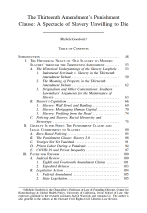By Michele Goodwin
Nearly sixty years ago, Dr. King penned the illuminating Letter from a Birmingham Jail, marking the persistence of criminal punishment in the lives Black Americans seeking inclusion, equality, and freedom. Symbolically, his confinement both foreshadowed the strange and troubling role incarceration would play in the lives of Black Americans generations to come and illustrated the connective fabric of slavery to his present conditions. The profundity of the letter cannot be ignored, nor the space from which Dr. King wrote it—incarcerated after peacefully protesting to advance civil rights for Black Americans. Decades later, many of the concerns undergirding the impetus for Dr. King’s powerful missive, including voter suppression, persist. Similarly, equality in education remains an unanswered goal and incomplete vision for the civil rights movement. In fact, the modern challenge no longer demands inclusion and desegregation alone—the urgent objectives undergirding Brown v. Board of Education —but rather sparing Black children from unequal surveillance, punishments, and the “school to prison” pipeline. Yet, equality in voting and education—as crucial as they are—did not comprise nor define the full vision for the civil rights movement or emancipation from enslavement for that matter. The path to substantive civil liberties and civil rights—and freedom in a meaningful sense—included dismantling discrimination in housing, employment, healthcare, food access, and criminal justice forged by lawmakers.
Boston: Harvard Civil Rights-Civil Liberties Law Review, 2022. 68p.



